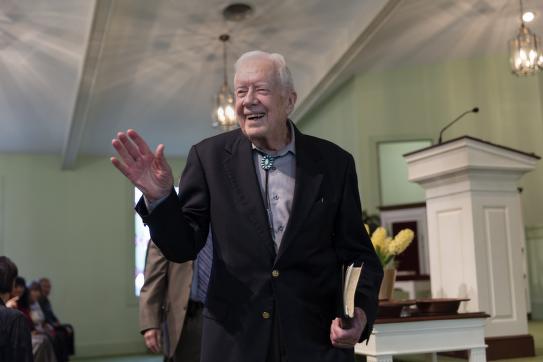On October 1, 2024, President Jimmy Carter turned 100 years old, becoming the first U.S. president to reach this milestone. Carter’s long life has fascinated historians, political analysts, and everyday citizens alike, not only for its extraordinary length but for the richness of his contributions both during and after his presidency. His journey from the White House to a life of humanitarian work, coupled with a philosophy rooted in simplicity, faith, and service, offers insights into how he has made it to a century.
The Oldest Living President
Jimmy Carter’s status as the oldest living U.S. president is no accident. Born in Plains, Georgia, in 1924, Carter grew up in a modest farming family, learning values that shaped his entire life—hard work, discipline, and faith. His approach to life has always been one of moderation, avoiding the excesses that can often come with power and influence. He has maintained an active lifestyle well into his later years, often credited with his long-lasting physical and mental vitality.
Despite facing health challenges, including a battle with cancer and brain surgery at the age of 95, Carter’s resilience is remarkable. His commitment to staying active, both physically and mentally, played a crucial role in his longevity. Up until his 90s, Carter continued his hands-on work with Habitat for Humanity, building homes and participating in charity events. His longevity is not just a product of modern medicine but a testament to his determination and lifestyle choices.
His Time in Office
Carter’s journey to the presidency was as unique as his life. Before his presidency, he served as the governor of Georgia and rose to national prominence as a Washington outsider during the post-Watergate era. Elected as the 39th president in 1976, Carter’s term in office was marked by both significant achievements and challenges.
Carter’s focus on human rights became a hallmark of his foreign policy, influencing his administration’s diplomatic efforts worldwide. His role in the Camp David Accords, which resulted in a peace agreement between Egypt and Israel, is regarded as one of the most important achievements of any American president in modern history. Carter’s strong moral compass guided much of his decision-making, but his tenure was also defined by domestic economic struggles, including high inflation, unemployment, and the energy crisis. The Iran hostage crisis at the end of his presidency cast a shadow over his legacy at the time, leading to his defeat in the 1980 election.
However, Carter’s presidency has often been viewed more favorably with time, particularly in light of his unwavering commitment to peace and diplomacy.
Humanitarian Legacy: A Life After the White House
Though his time in the White House was short-lived, Carter’s impact on the world grew exponentially in his post-presidency. After leaving office, he founded the Carter Center in 1982, an organization dedicated to promoting human rights, democracy, and disease eradication. His efforts in global health have helped control and eliminate diseases such as Guinea worm disease and river blindness in developing nations.
Carter’s commitment to social justice also extended into election monitoring, as the Carter Center has overseen elections in many countries, ensuring transparency and fairness. His work earned him the Nobel Peace Prize in 2002, highlighting his long-term dedication to fostering peace and justice worldwide.
A Life of Faith and Service
Carter’s faith has been a guiding force throughout his life. A devout Christian, he taught Sunday school at his local church in Plains, Georgia, well into his 90s. His humility and commitment to serving others have made him a beloved figure, transcending the typical perception of former presidents who fade into retirement.
In reflecting on his remarkable century of life, Jimmy Carter’s longevity seems intertwined with his enduring sense of purpose. His simple lifestyle, dedication to his faith, and commitment to serving others have not only defined his life but have perhaps been the keys to making it to 100. Carter’s story is a living reminder of the power of resilience, humility, and service in shaping a long and meaningful life.
